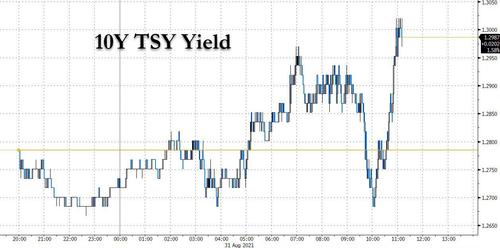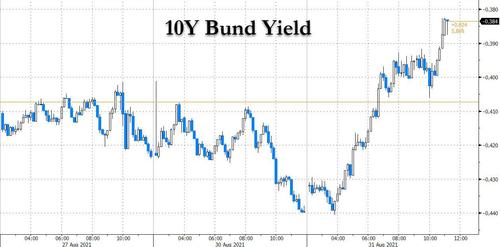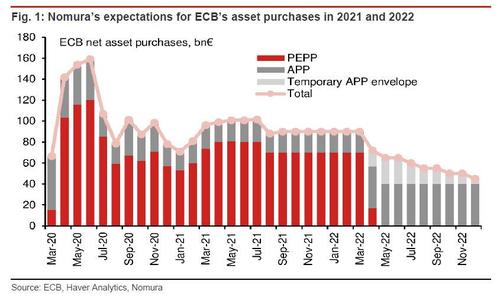Yields Jump To Session Highs After Knot Urges “Immediate” Slowdown To ECB Crisis QE
One would think that today’s dramatic drop in Consumer Confidence coupled with the plunge in the Chicago PMI and the record housing prices would be sufficient to push yields lower – after all, the Fed has to be paying attention and if anything, this should be a flashing red sign that the economy is now rapidly slowing and any taper talk – at least in the context of the Fed’s thinking – would come at the worst possible time. However, what should happen is never what does happen in this market, and indeed yields are now blowing wider with the 10Y rising above 1.30%…
… and following the sharp move in 10Y Bund yields which have moved 6bps higher on the day.
So what is behind this move higher in yields? According to traders, besides the usual illiquid month-end chaos, a big driver is the pile up by ECB hawks who are now openly hinting that the ECB will soon have to unveil its own tapering plans. Following on comment from the ECB’s Holzmann, who earlier said that the improved economic outlook (not to mention soaring euroarea inflation) warrants a reduction in bond buying, stating that “we are now in a situation where we can think about how to reduce the pandemic special programs — I think that’s an assessment we share”, and adding that “we have the opportunity to discuss how do we close the pandemic part and focus on the inflation part”, moments ago the (even more hawkish) Dutch ECB governor Klass Knot who according to Bloomberg, said that “the euro zone’s inflation outlook may have improved markedly enough to justify an immediate slowdown in European Central Bank stimulus, an end to its pandemic emergency bond program in March, and then a return to pre-crisis discipline.“
“I would expect a decision that should not be incompatible” with terminating the debt-buying plan in March, the Dutch governor said in an interview in Alpbach, Austria on Tuesday, discussing the options for next week’s Governing Council meeting. “That would imply a reduction in the purchase pace.”
As Bloomberg notes, “an initial debate will take place next week on whether to keep up an elevated pace of debt buying. The Governing Council also needs to decide in coming months on whether to extend or end its pandemic debt-buying program – known as PEPP — in March, and how to continue its more conventional quantitative easing program thereafter, known as the APP. “
“Both programs have been conceived under completely different conditions, and therefore the proportionality assessment that has been made at the start of these two programs has also been completely different,” Knot said. “Some of the flexibility that characterized PEPP would go against some of the safeguards that have been built into the APP.”
His comments make it clear that he, along with Holzmann, the Dutch governor will be among hawks at the ECB arguing that the APP should keep its stricter rules that currently insist that purchases should proportionately match the size of national economies.
Knot, who spoke the same day as economic data showed an inflation surge in the euro zone to 3%, also said that economic prospects may generally warrant a shift away from crisis settings.
“PEPP has a clearly delineated objective — repairing the damage that the coronavirus has inflicted on the inflation outlook,” he said, adding that such a goal is within reach.
“The stars are much better aligned than they have been for a long time for the return of inflation back to 2%,” Knot said. He sees a “credible perspective” that 10% to 20% of the transitory spike in prices will feed through to higher wage claims in the region.
Meanwhile, market consensus is for smooth sailing for months, and as we noted earlier showing Nomura’s tapering blueprint, few expect any deviations from a tapering schedule such as this one.
Could the ECB surprise and turn out much more hawkish than most expect? We doubt it – after all today’s hawkish comments are in keeping with the traditional strawman argumentation where the opposing voices are heard ahead of the main event, which as Powell demonstrated clearly last week, remains predominantly dovish. As such we expect much of the move higher in yields to reverse in the coming days, especially once the month-end rush is behind us.
Tyler Durden
Tue, 08/31/2021 – 11:33
via ZeroHedge News https://ift.tt/3mO1srt Tyler Durden


